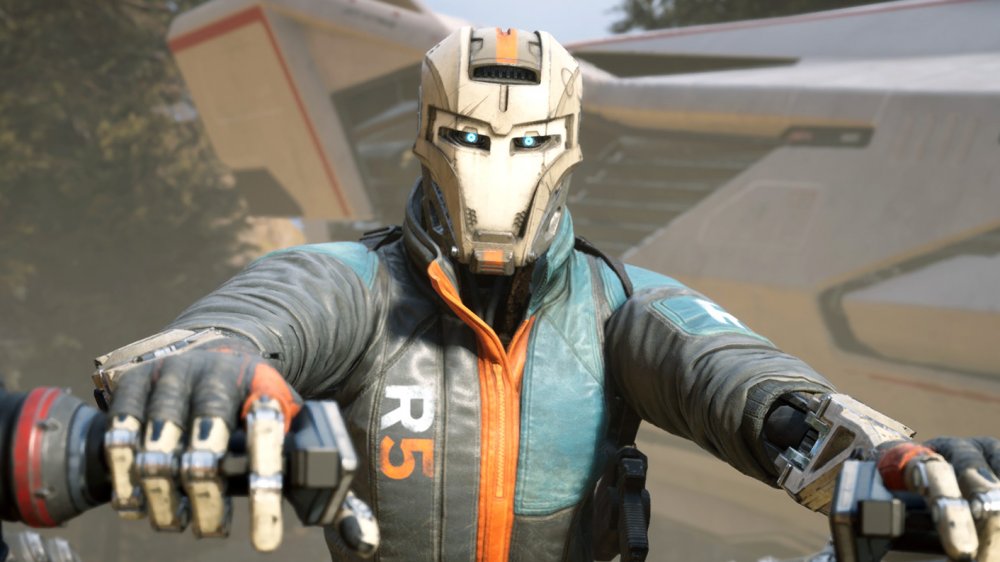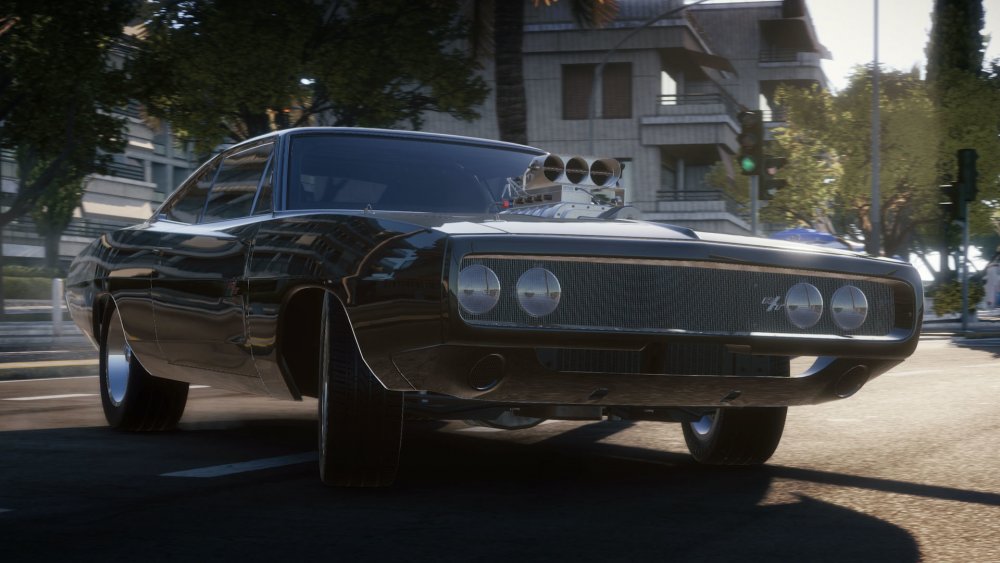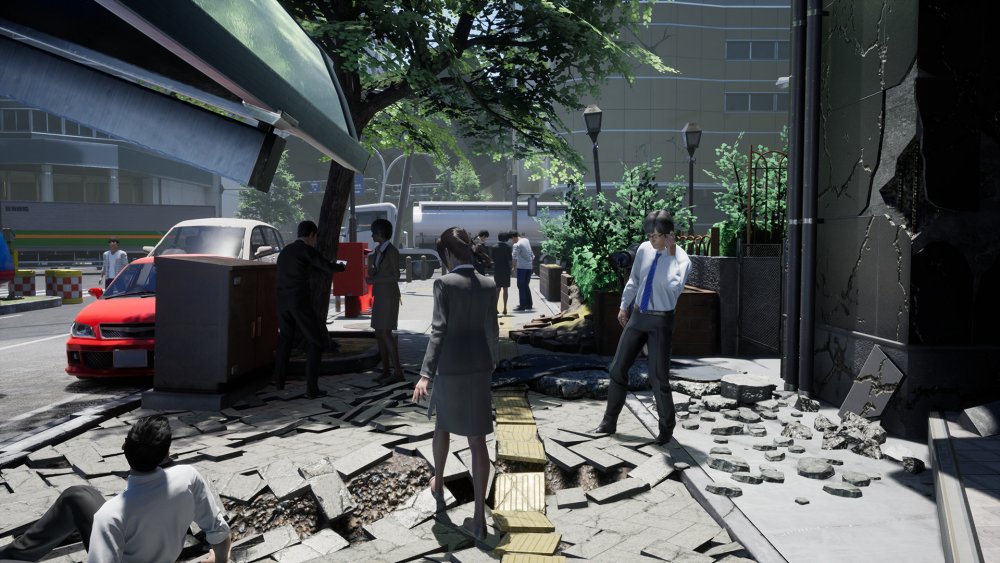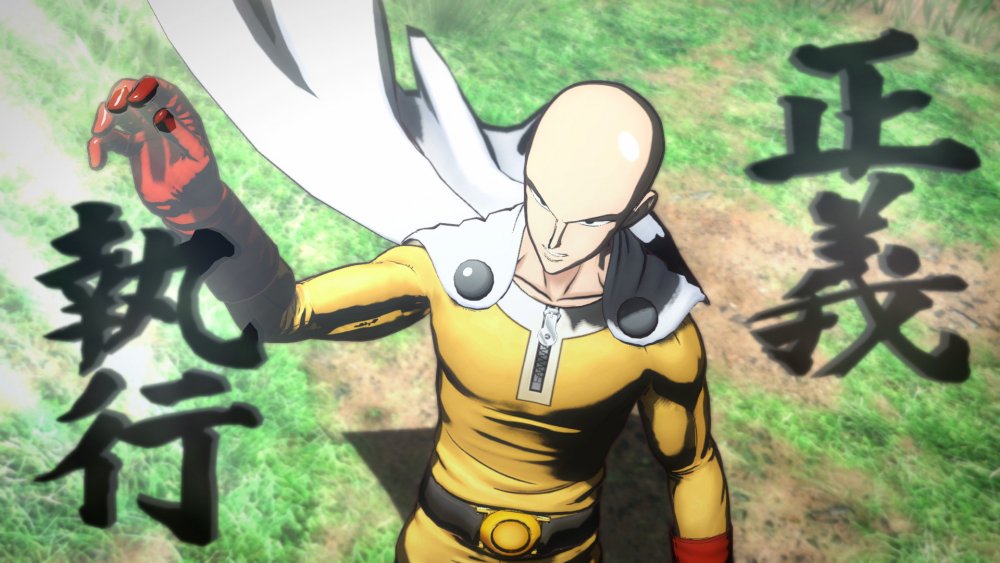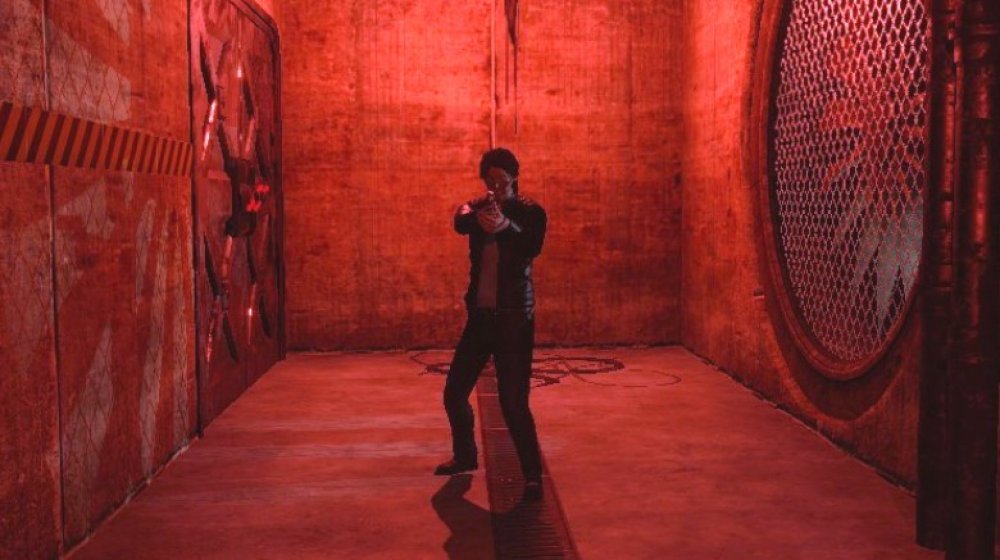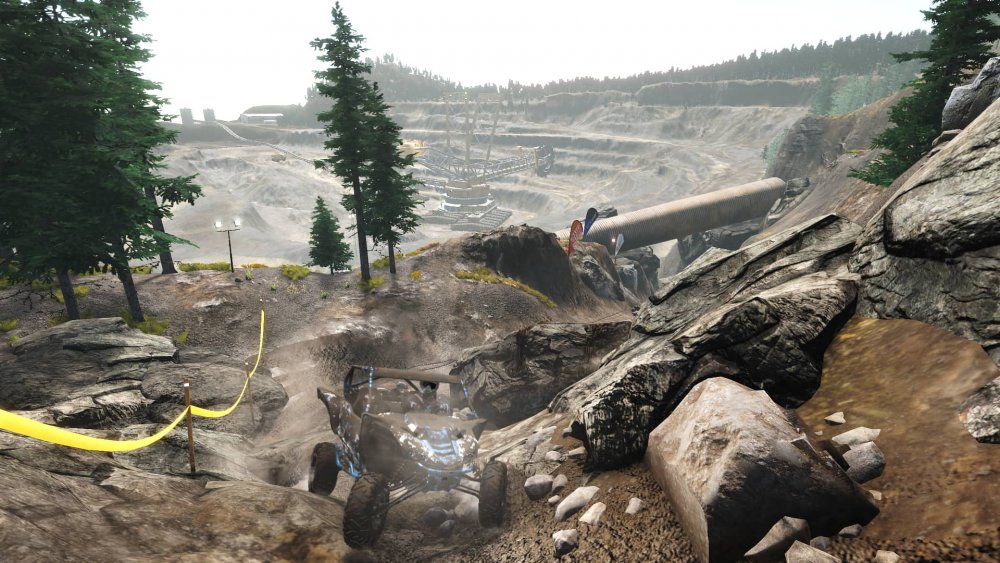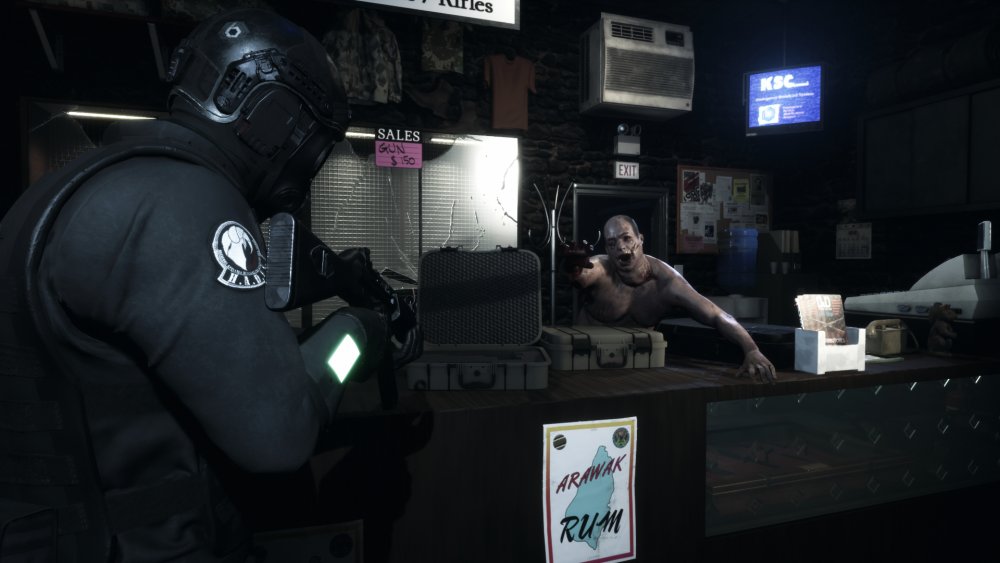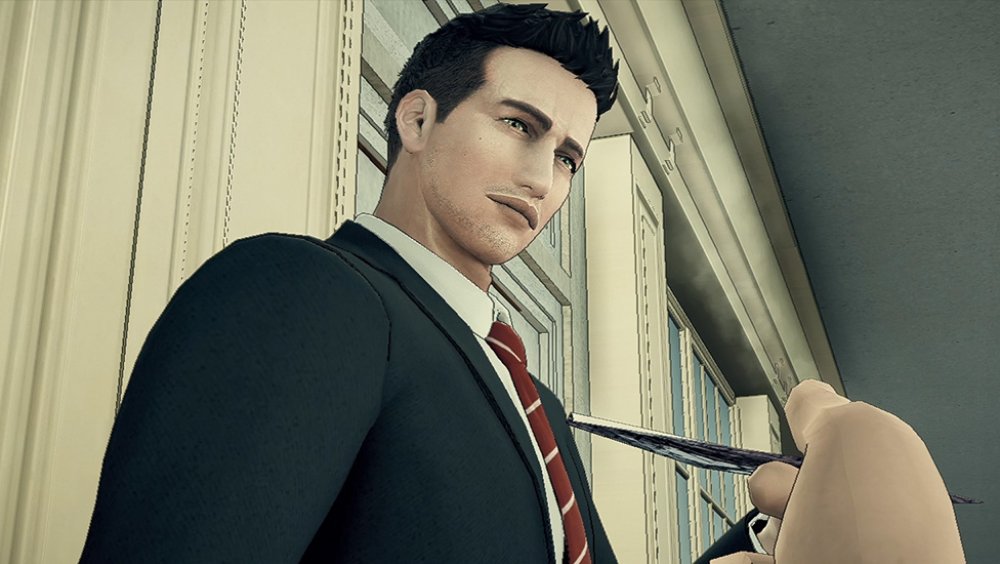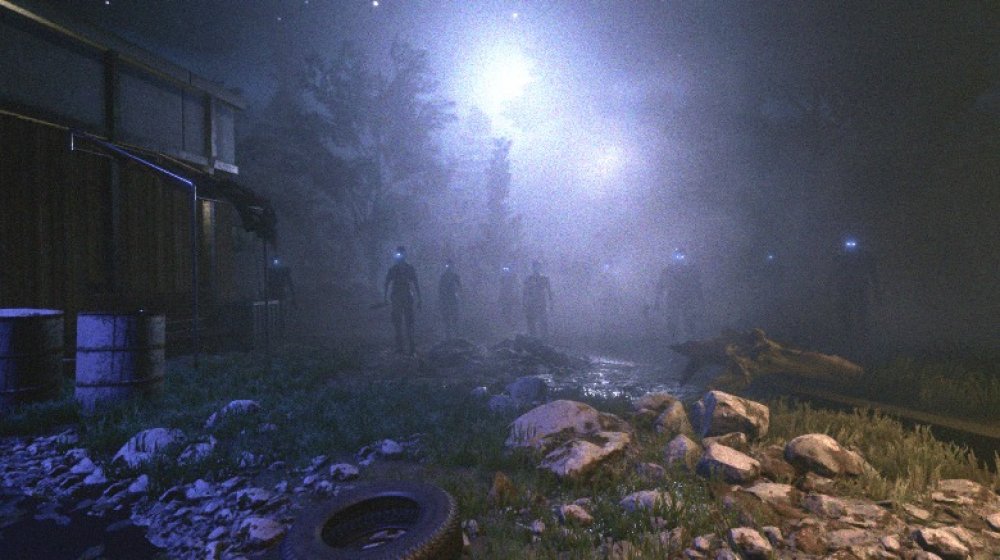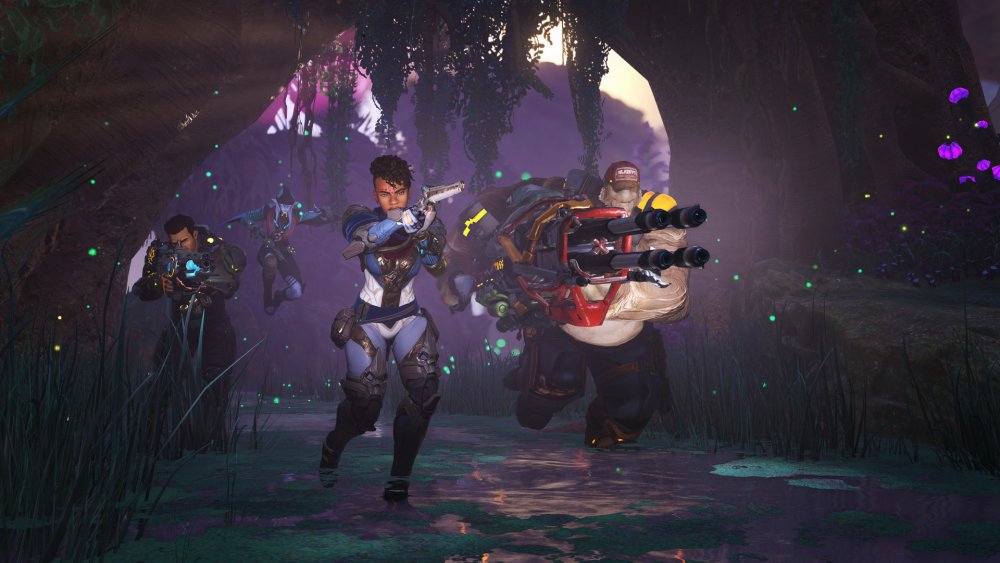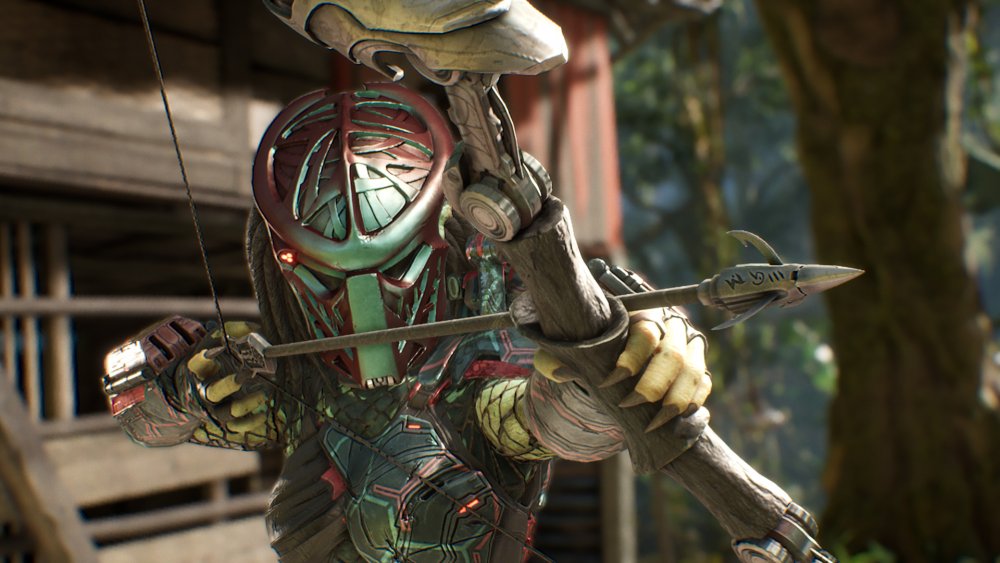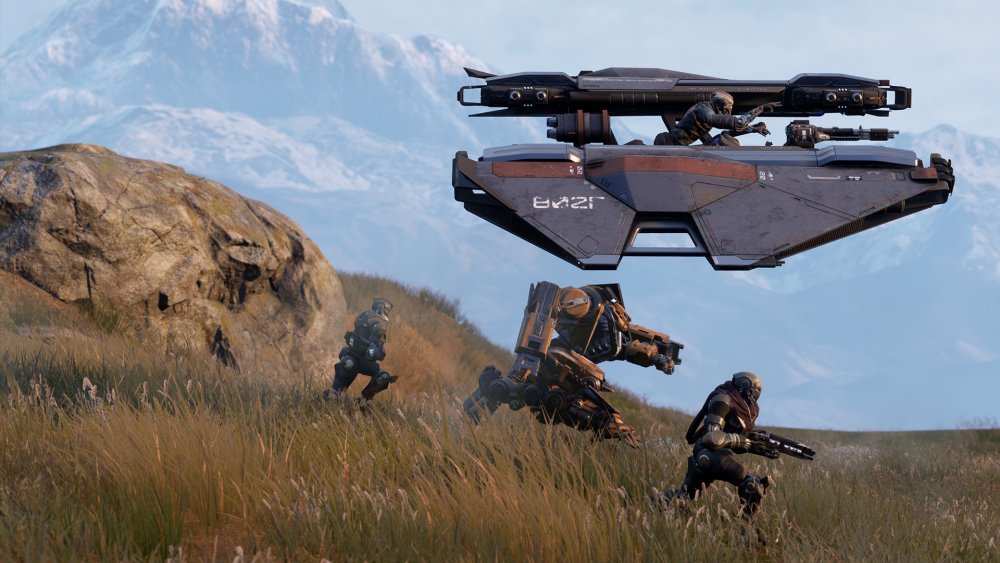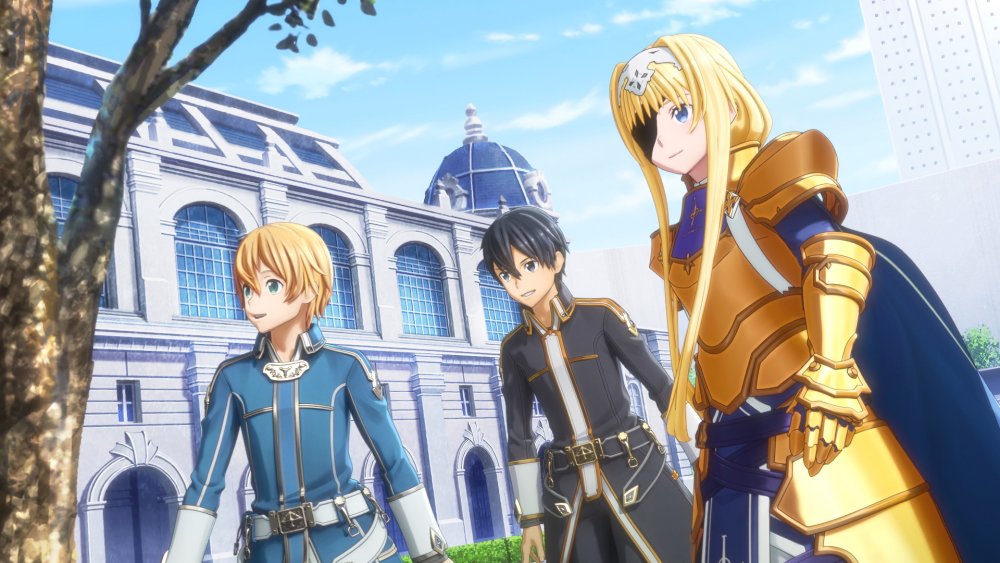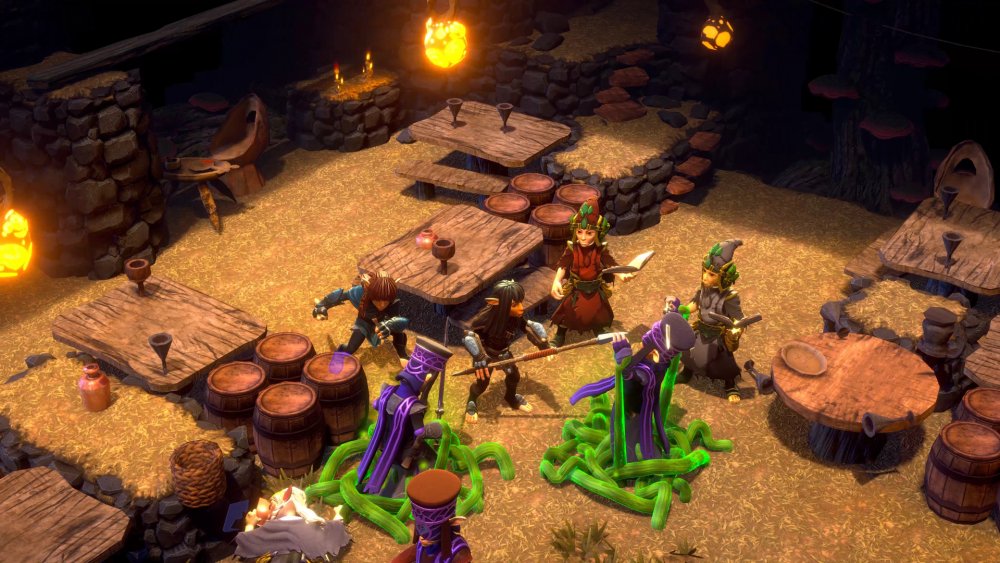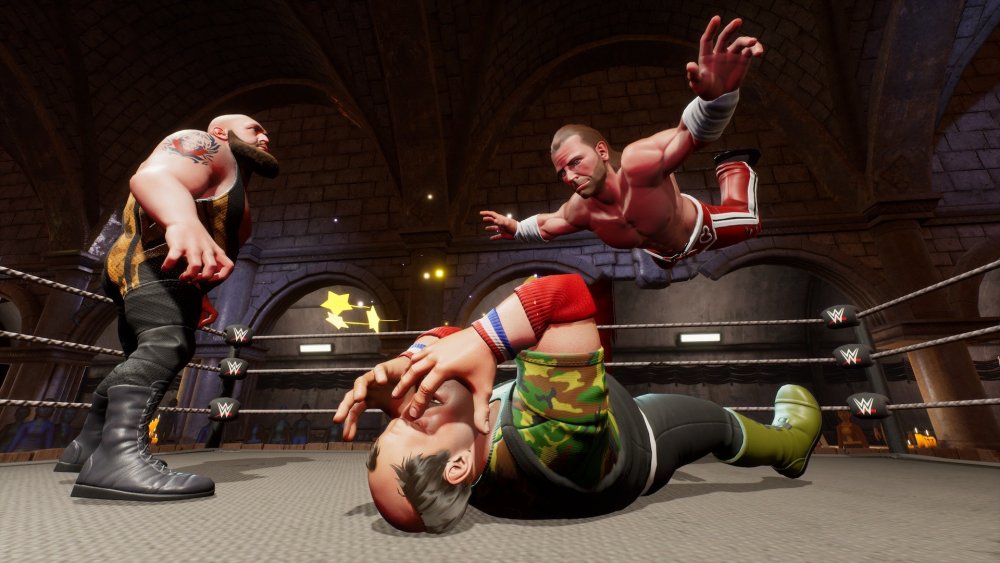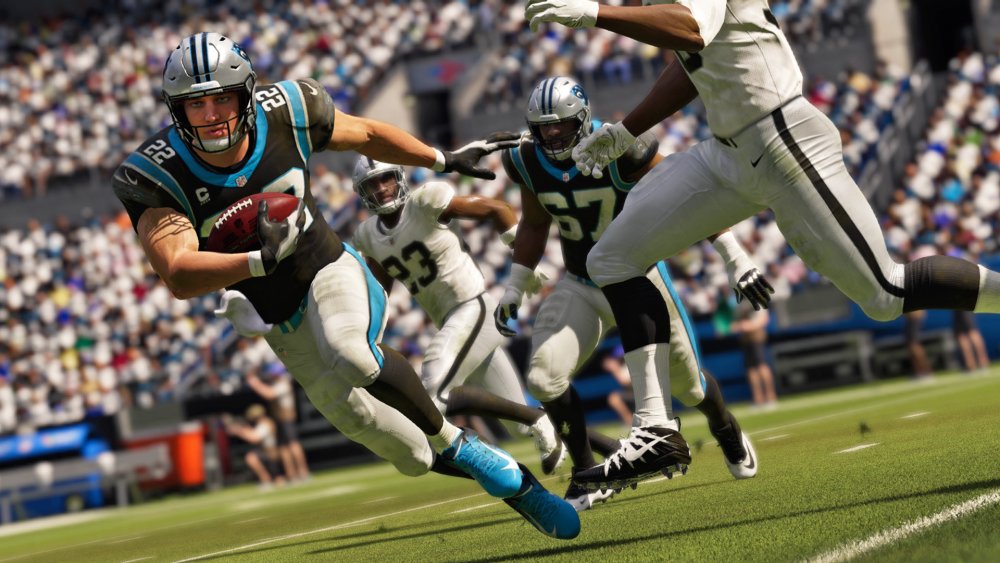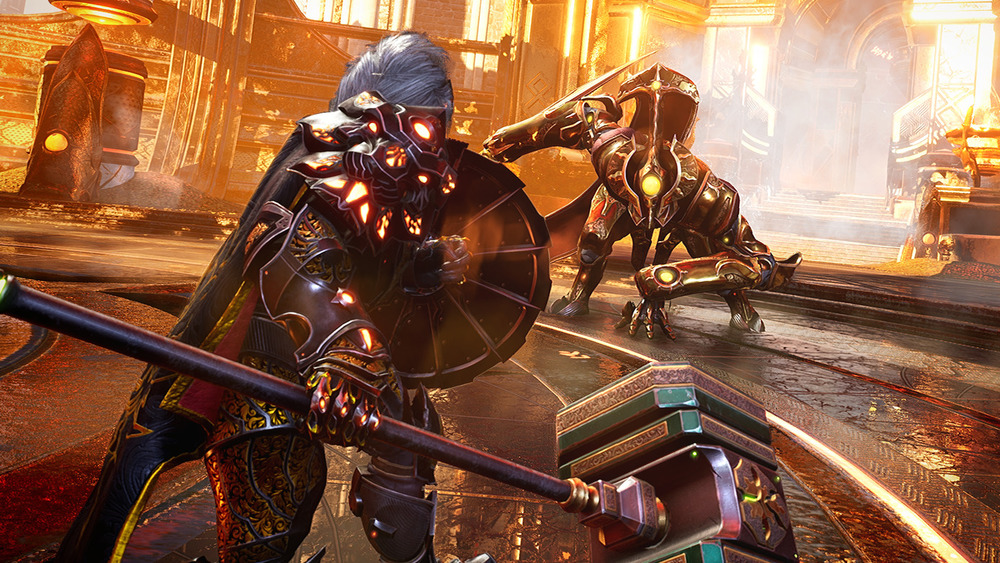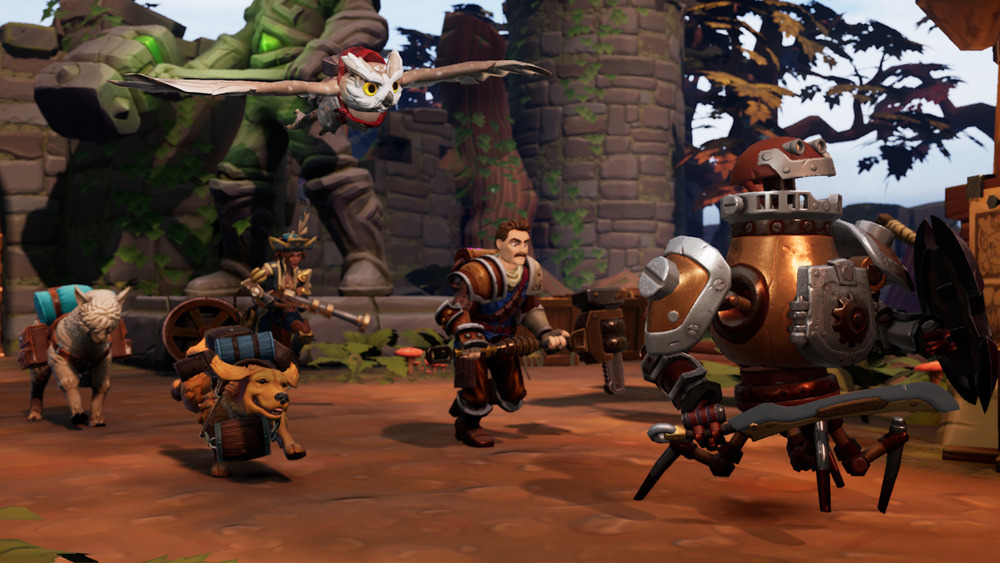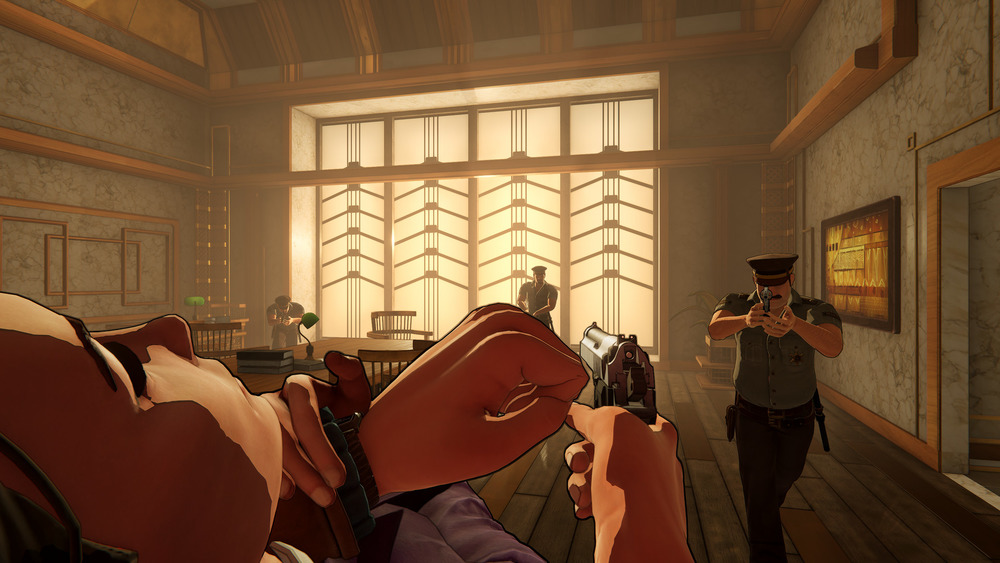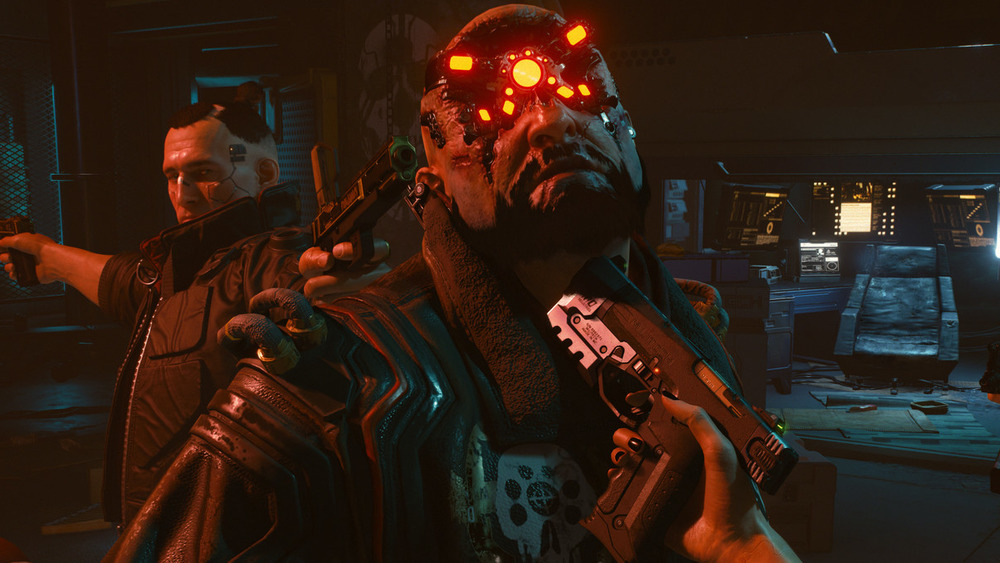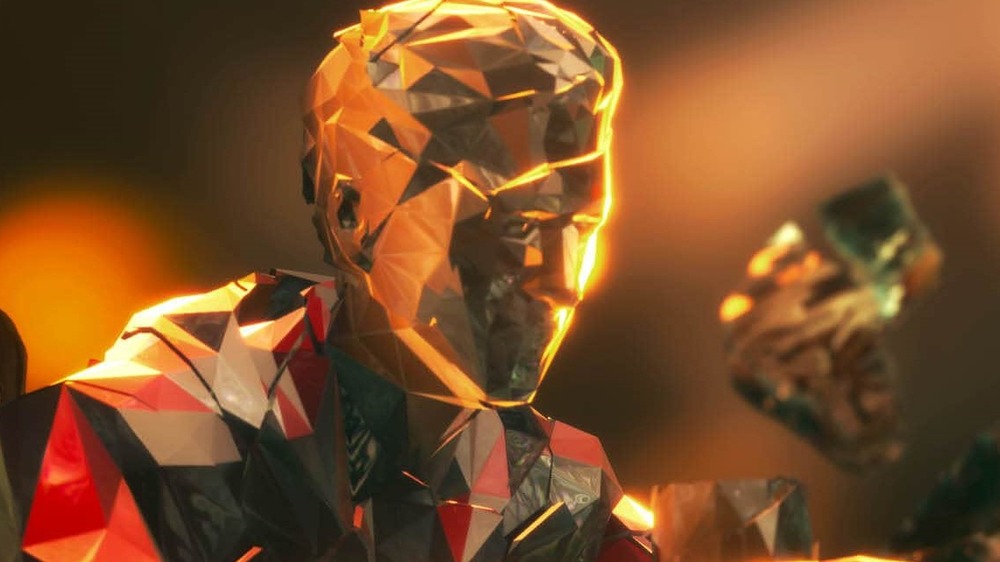Games That Totally Flopped In 2020
The year 2020 is the last one of this current console generation. Developers and publishers should be on the top of their games, sending off the Xbox One and PlayStation 4 with fantastical fireworks like Ori and the Will of the Wisps and Ghost of Tsushima. However, not every release can be great. The cosmic laws of balance have dictated that for every Final Fantasy 7 Remake, there must be a Switch port of The Outer Worlds. And thus, you can inevitably expect some games to flop around and stink up the joint.
Every video game release is a roll of the dice. It doesn't matter if a game is directed by a legendary producer or attached to a beloved franchise — there's always a chance a game will bomb, destined to live at the bottom of a Best Buy bargain bin.
Here are 2020's biggest gaming duds.
Fast & Furious Crossroads
The Fast & Furious franchise is known for three things: explosive action, fast cars, and Vin Diesel. Many gamers and Fast & Furious fans were excited when Fast & Furious Crossroads was announced during The Game Awards 2019. However, upon release, the game only delivered one of the franchise's key factors, and Diesel isn't even the protagonist.
The game's title, Fast & Furious Crossroads, is supposed to describe the action, but instead its first word details the game's length: fast. The game features a criminally short campaign, and it isn't even a fun ride. Missions are dull affairs that aren't challenging or fun, despite a hefty helping of vehicular combat. Moreover, the game left audiences ironically furious because of difficult driving controls — a cardinal sin in a racing game.
And yet, out of all the gripes and issues players have had with the game, the worst one is its price. Despite having all the hallmarks of a budget title, Fast & Furious Crossroads sports a $60 price tag, and players have yet to find anything in the game that would justify this amount.
Disaster Report 4: Summer Memories
In most video games, players fight against a defined villain that is assigned a voice and face. You might assume a game that stars a natural disaster as the antagonist would create a novel experience, and you would be correct. Unfortunately, it is "novel" in the sense it makes you want to read one instead.
Disaster Report 4: Summer Memories takes place shortly after a city-leveling earthquake, and your goal is simple: survive. However, the game fights you every step of the way. Despite lackluster graphics, Disaster Report 4 forces you to wait out long load times and slog through muddy framerates. But even when the game is supposedly working as intended, it isn't working as intended. Disaster Report 4 never tells you what to do or where to go, and the game refuses to progress until you guess what the developers were thinking. Disaster Report 4 also features survival mechanics such as maintaining thirst, hunger, stress, and bathroom meters, but they are just for show.
Add in an indecisive morality system that rewards you for helping a breastfeeding woman yet punishes you for punching slavers in the face (yes, seriously), and Disaster Report 4 turns into a survival game that may not survive very long on your console or PC before you decide to delete it.
One Punch Man: A Hero Nobody Knows
One Punch Man: A Hero Nobody Knows started as a webcomic-turned-manga about a superhero who could defeat any opponent with one punch — and was completely bored as a result. The series received critical acclaim and turned into a lucrative franchise, complete with a new video game. However, many fans might wish this was a game nobody knew.
In anime games, players usually want to either step into the shoes of their favorite characters or rub elbows with them as other characters. A Hero Nobody Knows, like its source material, bucks popular trends, but this time at the cost of fun. In the game, you can create a character, but you spend most of your time running from point A to point B and back again completing mundane, repetitive quests. Occasionally, you fight enemies, but the combat system is shallow, and you virtually never battle the iconic villains. Instead, A Hero Nobody Knows primarily pairs you with generic enemies who are frankensteined together in the character creator system.
Even though One Punch Man: A Hero Nobody Knows faithfully recreates the look of its source material, the end result is a game nobody wants.
Dawn of Fear
Many gamers consider Resident Evil the gold standard in retro horror. When players aren't asking Capcom to remake older titles, fans are trying to create their own Resident Evil-inspired games. However, these fan developers are learning the hard way there's more to Resident Evil than mansions and fixed camera angles.
Dawn of Fear tries to emulate the old Resident Evil experience, from the cramped hallways to the claustrophobic cameras, but it stumbles with every step. The game is poorly written thanks to a combination of bad dialogue and broken translations. Moreover, you will spend most of your time solving meh puzzles and running away from zombies since combat is a task and a half. The lock-on system is a roll of loaded dice if it decides to work, and even when locked on, you can still miss enemies.
However, what truly kills Dawn of Fear is its lack of scares. Virtually every fright the game tries to throw at you is predictable — save for game-breaking bugs. Those are truly frightening since the standard trick of reloading old saves doesn't work.
Dawn of Fear is what happens when you try to create a game by following a pre-existing formula without understanding what made it special.
Overpass
It's usually a good idea to offer a unique spin on an old genre. These kinds of games churn with potential, but sometimes have a gap between ideas and execution. You'd be surprised how easy it is to fall into that gap. Unless you played Overpass. Then you would have a solid idea.
On paper, Overpass sounds promising: Race through rocky, off-road tracks in ATVs that can climb over anything. However, promise is all the game has going for it since it is too difficult. Overpass isn't the soulsborne kind of fair difficulty where you learn from your mistakes and sharpen your skill to a razor's edge. This game is unfairly difficult because its vehicles control as if gravity is a thing that sometimes exists and sometimes does not. To add to this problem, Overpass' tutorial doesn't properly prepare you for the bumpy road ahead. How can anyone expect to climb a hill, no matter how slight, if a game won't teach you the basics?
This combination of frustratingly difficult tracks and an unreliable physics engine might make you want to finish the game, but only out of spite and not any sense of enjoyment.
Daymare: 1998
Developing a fan-made remake is a tricky, legally questionable process. On one hand, if you have enough talent, your project might get noticed by the original game's publishers. On the other hand, you could potentially receive a cease and desist letter. On a mutant third hand, even if you convert the fan-made remake into a legally distinct title, quality is not guaranteed.
Daymare 1998 started as an unofficial Resident Evil 2 remake that eventually transformed into its own game, albeit with RE2 hallmarks such as virus-made zombies and Paul Haddad. However, Daymare 1998 opts for more Resident Evil 4-like combat, even though it never nails down the aiming controls. Low framerates make the underwhelming gunplay even worse.
Everything about Daymare 1998 is slow, including the inventory system. To set itself apart, Daymare 1998 implements a unique reloading mechanic where players can manually insert bullets into magazines, which forces gamers to keep an eye on their ammo and magazine supply. But, the mechanic in practice is a bigger pain in the neck than zombie bites.
And while some games can ask players to overlook bad gameplay in exchange for engrossing narratives, Daymare 1998 isn't one of those games. If a story can't serve as a carrot on the stick, what's the point of playing through a slow, tedious game with bad combat? According to many gamers, there is none.
Deadly Premonition 2: A Blessing in Disguise
Deadly Premonition is probably the most divisive game available. The title is split between horror and comedy, and that unorthodox combination attracts and drives audiences away. Still, the game achieved cult status, and many fans were looking forward to the sequel. Whoever wished for the sequel might also have wished on a monkey's paw.
Deadly Premonition 2: A Blessing in Disguise is a shadow of the game that spawned it. Many gamers flocked to the original's quirky characters and unpredictable story, but Deadly Premonition 2 doesn't live up to the legacy of its predecessor. The narrative, which once again centers around a murder mystery, is more predictable, and the characters, while kooky, aren't as nuanced.
Gameplay doesn't fare much better, as the gun-heavy segments are a step down from the original. However, the true murderer of Deadly Premonition 2 is the performance, which strangles the framerate each time the player steps outside a building, even though the game world is sparsely populated.
Deadly Premonition 2: A Blessing in Disguise doesn't do much to hide its faults, which ends up cursing the whole experience.
Those Who Remain
In the gaming world, there's almost nothing worse than an intriguing premise ruined by poor execution. Titles can be demolished by one or two bad mechanics, and unfortunately, Those Who Remain is nothing but wasted potential.
On paper, Those Who Remain sounds like a scary good time. Wander around an abandoned town, decide the fates of citizens, and avoid deadly silhouettes that wait patiently in dark rooms. In practice, however, the game boils down to rifling through drawers and picking up everything you find. Puzzles are monotonous; they're less about carefully thinking things through and more about trying every item you have until you find one that works.
When Those Who Remain doesn't feature poorly designed puzzles, it frustrates with unfair chase and stealth sequences. The checkpoint system is basically rigged, so you usually have to repeat segments until the scares wear out. At least, until you discover the AI is easily tricked. On top of that, Those Who Remain's story is remarkably dull, and the promise of multiple endings is hollow. You could play through the game twice, forgive every NPC in one playthrough and condemn everyone the next, and you will still get the same ending.
Everyone who sticks around to fully explore Those Who Remain will wish they'd left a long time ago.
Crucible
Amazon is a nearly unstoppable force. The company has spread its roots into videos on demand and audiobook services, and it even owns Twitch. Since Amazon seems to have more supporters and money than Bill Gates, why not enter the video game market? How hard could it be? Famous last words.
Amazon's first foray into gaming was Crucible, a game that tried to twist the existing battle royale genre into a new, fun shape. However, the title just ended up being twisted.
Crucible featured several game modes, but its primary battle royale mode, Alpha Hunters, surgically removed aspects gamers love about the genre, such as item scavenging. Moreover, regardless of game mode, Crucible's single jungle map committed the cardinal sin of being far too large. Players could only effectively traverse the map by spamming movement abilities. Further, maps were populated by two kinds of enemies: braindead monsters (that gleefully ran into bullets) and rival players. Since each playable character was self-reliant by design and lacked support viability, PvP fights were determined by whichever team had the most guns. Players couldn't even level the playing field by calling for reinforcements since Crucible lacked voice and text chat.
Given the poor feedback, it's no wonder Crucible was shuffled back into beta before ultimately being canceled in October 2020.
Predator: Hunting Grounds
In 2017, IllFonic released the asymmetrical multiplayer/horror game Friday the 13th: The Game. The game was brutally murdered in the reviews department. In 2019, IllFonic revealed it would take another stab at the licensed asymmetrical multiplayer genre with Predator: Hunting Grounds. Did the company learn from its mistakes? Since the game is on this list, you can probably guess the answer.
While Hunting Grounds features three maps, they are almost identical, so while you don't retread the same ground every match, you will feel like you are. This sensation of déjà vu is aggravated by repetitive missions and game session loops. Predator: Hunting Grounds tries to mix things up with AI opponents, but their intelligence is subpar, and only when they actually work. The game also suffers from numerous performance issues, ranging from framerate pitfalls to magically floating objects.
In the spirit of fairness, IllFonic lovingly recreated Jason Voorhees' costumes in Friday the 13th: The Game, and that attention to detail continues in Predator: Hunting Grounds. The iconic Predator and its weaponry are rendered flawlessly, but that's a cold comfort given the rest of the game.
Predator: Hunting Grounds demonstrates that you can't sell a game on name alone, especially if it's a beloved name.
Disintegration
Every so often, a visionary enters the scene and blows audiences away. People assume this person can do no wrong, and then they do wrong. This happens to every writer and movie director, as well as video game creators. Case in point, Marcus Lehto, the man who created Halo and Disintegration.
Since Lehto was behind the wheel, Disintegration received a lot of hype. Unfortunately, the game falls short of its promises, especially in the storytelling department. Goals and character motivations remain foggy throughout the experience, and even though each character has a distinct personality, none are likable. To make matters worse, the narrative plays out as if Disintegration is continuing a story and players are already well-versed in the game's lore and terminology — even though they aren't.
While Disintegration's controls are on point, its campaign consists of completing the same missions over and over. The experience is less about telling a story and more about preparing gamers for multiplayer, but even that is a pipe dream since the average player count is reportedly in the single digits.
Lehto's dreams of a Disintegration esports future disintegrated right before ours eyes.
Sword Art Online: Alicization Lycoris
Sword Art Online is a divisive anime. While many viewers agree the Alicization arc improves on the anime's previous seasons, Sword Art Online: Alicization Lycoris is not viewed in such a forgiving light.
As with other games based on anime, Sword Art Online: Alicization Lycoris mostly follows the show's plot and lets players hang with the main cast. But in Alicization Lycoris, that is damning with faint praise. Alicization Lycoris has pacing issues since it crams most of the plot into a 10-15 hour first chapter. When that's done, you still have five more chapters to finish, and many of the game's cutscenes are so long they give Hideo Kojima titles a run for their money.
The story isn't Alicization Lycoris' only pitfall. The performance is geriatric. The game rarely reaches 30 frames-per-second when characters stand around and twiddle their thumbs. During battle, you can count the frames on your hands. Even when the game doesn't have the framerate of a PowerPoint presentation, animations look dated, the camera rarely cooperates, and combat mechanics don't make sense.
Add in the time-honored tradition of poor female portrayals — since the franchise is a harem anime at heart — and Sword Art Online: Alicization Lycoris essentially demolishes the goodwill built up from its namesake season.
The Dark Crystal: Age of Resistance Tactics
Usually, any project bearing the Jim Henson Company name can do no wrong. Audiences love the studio's work, especially The Dark Crystal, and fans were looking forward to the prequel Netflix series, The Dark Crystal: Age of Resistance. Nobody could have predicted a game studio would produce a Final Fantasy Tactics-esque tie-in game. That might have been a red flag.
From the get-go, The Dark Crystal: Age of Resistance Tactics fails to impress with bland graphics that evoke none of the source material's charm or magic. Moreover, the game is a rushed retelling of the show, which is ironic since the game lasts about 20 hours and the series only clocks in around nine hours.
Even though "tactics" is part of the game's name, strategy plays barely any part. Each battle feels samey, even when Age of Resistance Tactics throws in environmental hazards. Moreover, many class abilities are either overpowered or useless without other abilities. The end result is a combat system that punishes experimentation — not that you will want to experiment since the menus for using and assigning skills are awkwardly clunky.
The Dark Crystal: Age of Resistance Tactics is too simple for strategy game aficionados and not robust enough for Dark Crystal fans. The game falls into the pit of trying to please multiple audiences and ends up pleasing nobody.
WWE 2K Battlegrounds
2K sits on both sides of the quality spectrum. Audiences praise the company when it publishes fictional games such as Borderlands 3, BioShock Infinite, and XCOM 2. Meanwhile, sports games such as NBA 2K21 and WWE 2K20 usually attract ire. You might think this trend indicates the further 2K strays from reality, the better, but WWE 2K Battlegrounds reminds gamers that isn't always the case.
Unlike 2K's previous WWE titles, Battlegrounds doesn't strive for realism. The game is proudly cartoonish, with action figure-esque character models, over-the-top moves, and interactive stage hazards such as live alligators. On paper, these features should bring new life to the WWE 2K formula. Instead, critics and players seem to largely feel the game has as much life as a real action figure.
According to YouTuber Jim Sterling, Battlegrounds simplifies combat to the point of button-mashing blandness, and none of the characters demonstrate any of their real-world counterparts' flair or personalities. As Destructoid pointed out, every wrestler blends into one another thanks to identical movesets. However, it appears what truly suplexed Battlegrounds' fun factor is monetization. Most characters, customization options, and abilities are held hostage by microtransactions, and you can only unlock them by slowly grinding matches, daily missions, and levels — or by paying exorbitant sums of money.
The only universal praise audiences gave WWE 2K Battlegrounds is that it is more stable than WWE 2K20. That isn't saying much since 2K20 rang in the new year with a Y2K-esque game breaking bug.
Madden NFL 21
Recently, many long-standing sports video game franchises have spiraled down in quality. Gamers have voiced their displeasure that once-proud series such as NBA 2K and Madden NFL have lapsed into buggy, microtransaction-infested shadows of their former selves. Some fans try to keep a sliver of hope alive, but titles such as Madden NFL 21 tackle those hopes into the gutter.
By all accounts, Madden NFL 21 is a new game in name only. Based on IGN's review, NFL 21 doesn't bring much new to the table, and most of what it does bring is bad. The title is full of bugs, and its new story mode has a laughably poor quality. NFL 21 also goes all in for microtransactions, which, according to GameSpot, makes players who don't drop extra cash in a game that already costs money feel disadvantaged.
Ricky Frech of DualShockers observed that NFL 21's only saving grace is The Yard, which is basically just simulation 6v6 backyard football. The Yard is widely regarded as an improvement over the base game because it gets rid of reviled mechanics such as blocking. In other words, Madden NFL 21 is at its best when you aren't playing Madden NFL 21.
Godfall
When Gearbox announced Godfall, many were initially optimistic. Gearbox is beloved for essentially perfecting the looter shooter genre, and Godfall is a medieval spin that replaces guns with swords — and Gearbox's developer seat with Counterplay Games. However, the end result falls more on the Duke Nukem Forever spectrum of game quality than on the Borderlands side. Not a good way to welcome a new console generation.
According to Paul Tassi of Forbes, Godfall has two things going for it: graphical fidelity and combat, but even those boons are too much for the game. Godfall looks so good that the PS5 can't keep up with the action, resulting in frame drops. Loot also isn't as crucial to gameplay since, as GameSpot's Richard Wakeling pointed out, every weapon shares the same combos.
Wakeling furthered emphasized that even though the levels look gorgeous and distinct, that's all they do. They came off as little more than "hollow set dressing." The game's verdant forests don't change up gameplay any more than its alien coral jungles. IGN asserted that, no matter where you go, you will end up blindly following quest markers as you plow through missions and enemies. The story, unfortunately, doesn't contribute much either: you're the good guy, and you have to stop the bad guy. That's about as complicated (and as exciting) as it gets, despite Godfall's excellent literary inspirations.
As TheGamer put it, Godfall is a "generic launch game" with graphics that write a check its gameplay can't cash.
Torchlight 3
Once upon a time, the Diablo franchise was on top of the world. But, all good things must come to an end, especially when the main brains behind Diablo jump ship. That's what happened when co-founders of Blizzard North, Max and Erick Schaefer, teamed up with Fate creator Travis Baldree to start Runic Games and produce a spiritual successor, Torchlight. Dungeon crawler fanatics revere Torchlight and its sequel, and audiences had high expectations for the inevitable Torchlight 3. Hype goeth before a fall.
Many critics, such as Destructoid's Jordan Devore, feel Torchlight 3 doesn't innovate or experiment, let alone offer as much depth as its older sibling, Torchlight 2. While PC Gamer reported that Torchlight 3's combat is solid, it is hardly enough to keep players entertained. Each class has a unique charm and mechanics that set them apart from other RPG staples — name another game that lets you play a medieval engineer accompanied by a literal pain train that spews fire and death. But, according to Game Rant, systems that should glue everything together, such as death, resurrection and "contracts," fail in their duties.
Torchlight 3 reportedly isn't a bad game, just a mediocre one that falls short of its pedigree — which is just as damning to many gamers.
XIII (Remake)
Some people may not have realized that the recent XIII game released by Microids is a remake of a little-known shooter (based on a Belgian comic) developed by Ubisoft. The original didn't hit its sales targets, but it acquired cult classic status. XIII sounds like the ideal game to remake and a guaranteed success, but, based on critical and player reception, it is arguably one of the worst games of 2020.
The XIII remake is widely regarded as inferior to its 2003 cousin. The new game features the same story beats and same voice acting as the original. However, as emphasized by Screen Rant, the remake replaces the striking cel-shaded graphics with "basic-looking 3D models with stark, ugly black outlines," and it throws out crowd pleasing sound design for audio that rarely matches the on-screen action.
While the XIII remake's presentation is a notable step down, its performance is reportedly even worse. Demonstrated by YouTuber Gmanlives, the game tries to kill your eardrums with audio bugs, and enemies have the intelligence of headless running chickens — which is coincidentally their favorite combat tactic. Moreover, the game is just plain unoptimized.
At the time of this writing, the XIII remake was available for about $40. Based on reviews, the original looks, plays, sounds, and performs better but costs a measly $6 and can run on any potato PC. There's a clear winner here.
Cyberpunk 2077 (Xbox One & PS4)
If you played Cyberpunk 2077 on PC, odds are good that you experienced all the wonder of Night City as CD Projekt RED intended — although you still had to be careful with your save files. If you played the game on consoles, well, no two ways about it: you're out of luck.
The Xbox One and PlayStation 4 ports of Cyberpunk 2077 are poorly optimized. The game takes a long time to load on last-gen consoles, and even when it does, it isn't done loading. You can literally see the game process polygonal abominations into recognizable shapes. Moreover, the physics engine loves to fight with players. While CD Projekt Red didn't sacrifice any mechanics, game size, or story for console ports, the lackluster performance all but ensures you won't enjoy any of it.
Not only did Cyberpunk 2077's console versions destroy the good faith CD Projekt Red built up with the Witcher games, but gamers may be joining hands to file a lawsuit that accuses the company of intentionally misrepresenting its product. It doesn't help matters that the Xbox One and PS4 versions have cost the company $1 billion — or as one employee reportedly pointed out, CD Projekt Red made employees work crunch hours to produce a game about corporate exploitation.
Twin Mirror
Dontnod Entertainment ingratiated itself with narrative adventure fans with when it developed Life is Strange, and from then on, most gamers trusted that Dontnod would push out games with a certain level of quality. The studio's latest title, Twin Mirror, betrayed that trust.
In Twin Mirror, you play as Sam Higgs, an investigative journalist who revisits his hometown after alienating everyone there with a whistleblower article on the local coal mine's safety violations. He wakes up from a drunken stupor with blood on his shirt, assuming he killed someone, but that's about as good as Twin Mirror gets. The game doesn't build on its setup, and at times it lacks coherence (or optimization). To add insult to injury, the game lacks notable characters save one, who is ironically a figment of Higg's imagination.
Twin Mirror might use the same gameplay loop as Life is Strange (i.e., wander around an area until you find every interact-able item) and presents Higgs as a self-styled detective, but the title rarely requires much thought. In fact, you will probably spend more brain power figuring out why the game is so filled with Pac-Man references.

